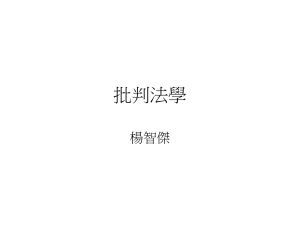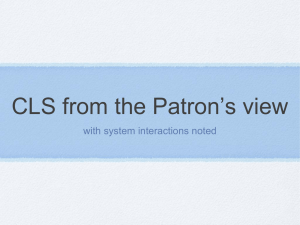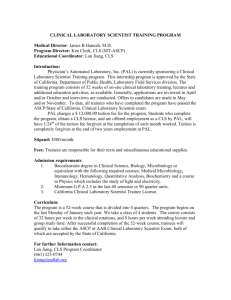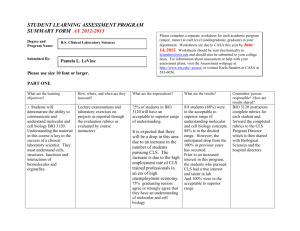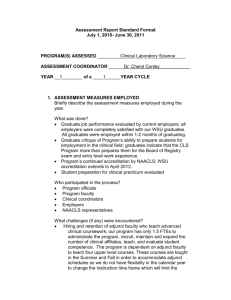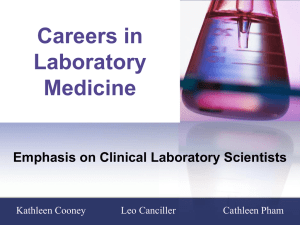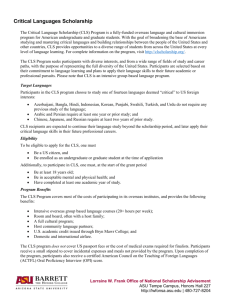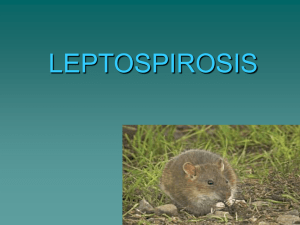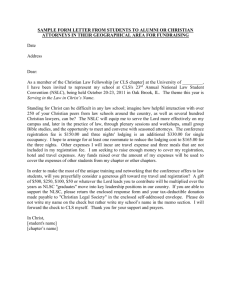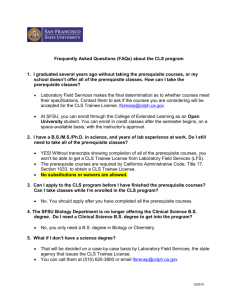CLS
advertisement
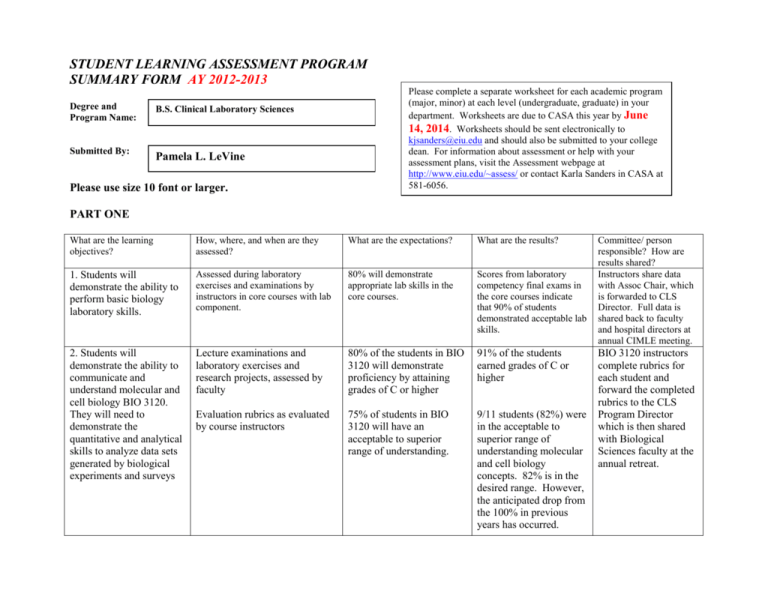
STUDENT LEARNING ASSESSMENT PROGRAM SUMMARY FORM AY 2012-2013 Degree and Program Name: B.S. Clinical Laboratory Sciences Submitted By: Pamela L. LeVine Please use size 10 font or larger. Please complete a separate worksheet for each academic program (major, minor) at each level (undergraduate, graduate) in your department. Worksheets are due to CASA this year by June 14, 2014. Worksheets should be sent electronically to kjsanders@eiu.edu and should also be submitted to your college dean. For information about assessment or help with your assessment plans, visit the Assessment webpage at http://www.eiu.edu/~assess/ or contact Karla Sanders in CASA at 581-6056. PART ONE What are the learning objectives? How, where, and when are they assessed? What are the expectations? What are the results? 1. Students will demonstrate the ability to perform basic biology laboratory skills. Assessed during laboratory exercises and examinations by instructors in core courses with lab component. 80% will demonstrate appropriate lab skills in the core courses. Scores from laboratory competency final exams in the core courses indicate that 90% of students demonstrated acceptable lab skills. 2. Students will demonstrate the ability to communicate and understand molecular and cell biology BIO 3120. They will need to demonstrate the quantitative and analytical skills to analyze data sets generated by biological experiments and surveys Lecture examinations and laboratory exercises and research projects, assessed by faculty 80% of the students in BIO 3120 will demonstrate proficiency by attaining grades of C or higher 91% of the students earned grades of C or higher Evaluation rubrics as evaluated by course instructors 75% of students in BIO 3120 will have an acceptable to superior range of understanding. 9/11 students (82%) were in the acceptable to superior range of understanding molecular and cell biology concepts. 82% is in the desired range. However, the anticipated drop from the 100% in previous years has occurred. Committee/ person responsible? How are results shared? Instructors share data with Assoc Chair, which is forwarded to CLS Director. Full data is shared back to faculty and hospital directors at annual CIMLE meeting. BIO 3120 instructors complete rubrics for each student and forward the completed rubrics to the CLS Program Director which is then shared with Biological Sciences faculty at the annual retreat. Prior to an increased interest in this program, the students who pursued CLS had a true interest and talent in lab and 100% were in the acceptable to superior range. This number is expected to drop as students are pursuing CLS because of the 100% job placement, despite their skills or lack thereof. CLS Student Survey National Accrediting Agency for Clinical Laboratory Sciences exam (NAACLS): Molecular and cellular biological components are a significant portion of the exam. Passing this exam would indicate strength in molecular and cellular biological science knowledge 75% graduating seniors agree or strongly agree that they have an understanding of molecular and cell biology The CLS students did agree or strongly agree that the CLS curriculum enhanced their understanding of molecular and cell biology concepts. 100% passing rate on the National Accrediting Agency for Clinical Laboratory Sciences (NAACLS) exam 100% of the 2011 graduates passed the NAACLS exam. Although the competition has been increasing and the potential for student success in BIO 3120 may decline, I fully expect the percent of students passing the NAACLS to remain close to 100%. The CLS Program Director tabulates the data and shares the information with the Biological Sciences Dept during the annual faculty retreat. Info shared with the hospital directors at the annual CIMLE meeting. The affiliated hospital coordinates the testing through NAACLS and share pass/fail information with the CLS Program Director. This information is shared with Sciences faculty at the annual retreat. 3. Students will demonstrate the ability to communicate and understand immunological concepts BIO 3210. They will need to demonstrate the quantitative and analytical skills to analyze data sets generated by biological experiments and surveys Lecture examinations and laboratory exercises and research projects, assessed by faculty 80% of the students in BIO 3210 will demonstrate proficiency by attaining grades of C or higher 100% of the students earned grades of C or higher Evaluation rubrics as evaluated by course instructors 75% of students in BIO 3120 will have an acceptable to superior range of understanding. 8/8 students (100%) were in the acceptable to superior range of understanding immunology concepts. CLS Student Survey National Accrediting Agency for Clinical Laboratory Sciences exam (NAACLS): Molecular and cellular biological components are a significant portion of the exam. Passing this exam would indicate strength in molecular and cellular biological science knowledge 75% graduating seniors agree or strongly agree that they have an understanding of molecular and cell biology 100% passing rate on the National Accrediting Agency for Clinical Laboratory Sciences (NAACLS) exam BIO 3210 instructors complete rubrics for each student and forward the completed rubrics to the CLS Program Director which is then shared with Biological Sciences faculty at the annual retreat. The CLS students did agree or strongly agree that the CLS curriculum enhanced their understanding of immunology concepts. 100% of the 2013 graduates passed the NAACLS exam. The competition has been increasing and the potential for student success in BIO 3210 may decline, however, I fully expect the percent of students passing the NAACLS to remain close to 100%. The CLS Program Director tabulates the data and shares the information with the Biological Sciences Dept during the annual faculty retreat. Info shared with the hospital directors at the annual CIMLE meeting. The affiliated hospital coordinates the testing through NAACLS and share pass/fail information with the CLS Program Director. This information is shared with Sciences faculty at the annual retreat. 4. Students will enhance global citizenship and demonstrate ethical behavior by: Response to CLS student survey Participation in clubs including volunteering. 50% of graduating seniors will indicate that they have participated in clubs. Newly added to assessment. No data this year. __ of graduating seniors indicated that they participated in one or more of these clubs. Close to 100% as this is incorporated into the internship experience. A drop in this percentage will be due to failure in the internship or withdrawal. As the expectations for admission to the internship is competitive, it should deter failure or withdrawal. In the last 7 years approx. 29 students out of 29 have successfully completed the internship. Internship experience Inherent to working/learning environment during internship Data will be shared with Sciences faculty at the annual retreat. 5. Students will demonstrate critical thinking skills. A necessary component as a clinical laboratory scientist. At the very least the student needs to identify different experimental approaches, be able to extract some information from descriptive passages and present results. 6. Students will demonstrate their ability to write effectively. To succeed as a professional students, need to have strong written communication skills. Laboratory exercises on course projects as reported through the evaluation rubrics 75% of students will have an acceptable to superior range of demonstrated critical thinking skills 18/19 (95%) students demonstrated acceptable to superior ranges of critical thinking skills. 95% is in the desired range. Molecular and Cell biology BIO 3120 and Immunology BIO 3210 instructors complete rubrics and share with CLS Program Director which is then shared with Biological Sciences faculty at the annual retreat. and the hospital directors CLS Student Survey 75% of graduating seniors agree or strongly agree that the program enhanced their critical thinking skills Information shared with Biological Sciences and hospital directors CLS Student Survey 75% of students will indicate that they had an acceptable to superior range of demonstrated writing skills The CLS students did agree or strongly agree that the CLS curriculum enhanced their critical thinking skills No data reported this year on CLS students. Students listed are biology. Electronic Writing Portfolio data Students will obtain at least a passing rating (3-4) on the Electronic Writing Portfolio No data collected this year. CLS Program Director sends survey to students finishing their hospital rotation. The students then send back their responses to the CLS Program Director which is then shared with Biological Sciences and the hospital directors Information received from Karla Sanders. PART TWO Describe your program’s assessment accomplishments since your last report was submitted. Discuss ways in which you have responded to the CASA Director’s comments on last year’s report or simply describe what assessment work was initiated, continued, or completed. This year I incorporated global citizenship and ethical behaviors as components in the assessment package. The CLS Student Survey was modified this year, to track their involvement in clubs as a way to track their progress towards their global citizenship. The ethics and global citizenship are an inherent part of the hospital working/learning environment during the student. The survey was sent before the modification took place, therefore, we will begin to collect data starting next year. This year I started incorporating data that is collected from biology. PART THREE Summarize changes and improvements in curriculum, instruction, and learning that have resulted from the implementation of your assessment program. How have you used the data? What have you learned? In light of what you have learned through your assessment efforts this year and in past years, what are your plans for the future? In the last few years we have student comments which indicate that they value their education in the CLS program. Immediate employment in field of training remains at 100% which has resulted in explosive growth in CLS enrollment. We continue to see the negative side of the interest in this program as there are students who are weak in the sciences wanting to pursue the field. The realization of their science weakness typically occurs during their time in BIO 3120 Molecular and Cellular Biology, as there are fewer students that enroll in BIO 3210 Immunology. Although it becomes more difficult to gain admission to the hospitals for the final year internship, those that do make it in, are very strong candidates. Last year there were some modifications made to the CLS program to align the required coursework and electives to more closely replicate the Biological Science degree. This change has made it easier for students to switch to a biology degree from CLS as they learn they are not qualified academically for the CLS program. To qualify for board certification the hospitals require a minimum of 16 credit hours in chemistry including organic chemistry or biochemistry. They also require 16 hours of biology that includes microbiology and immunology. These requirements are required for the hospitals to remain certified by the National Accrediting Agency for Clinical Laboratory Sciences (NAACLS). The data is suggesting that the preparation at EIU solid based on the student responses and results of the national certification pass rate of 100% Almost all courses required by the CLS program are the same as those required for the Biology degree. Therefore course evaluations in biology are relevant for the CLS program.
